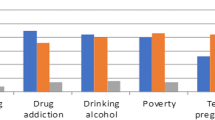Abstract
Depression is one of the most common mental disorders with millions of people suffering from it. It has been found to have an impact on the texts written by the affected masses. In this study, our main aim was to utilize tweets to predict the possibility of a user at-risk of depression through the use of natural language processing (NLP) tools and deep learning algorithms. LSTM has been used as a baseline model that resulted in an accuracy of 95.12% and an F1 score of 0.9436. We implemented a hybrid BiLSTM + CNN model which we trained on learned embeddings from the tweet dataset was able to improve upon previous works and produce precision and recall of 0.9943 and 0.9988, respectively, giving an F1 score of 0.9971.
Access this chapter
Tax calculation will be finalised at checkout
Purchases are for personal use only
Similar content being viewed by others
References
L.S. Radloff, The CES-D scale: a self-report depression scale for research in the general population. Appl. Psychol. Meas. 1(3), 385–401 (2019). https://doi.org/10.1177/014662167700100306
R.L. Spitzer, K. Kroenke, J.B. William, Validation and utility of a self-report version of PRIME-MD: the PHQ primary care study. Primary care evaluation of mental disorders. Patient health questionnaire. JAMA 282(18), 1737–1744 (1999). https://doi.org/10.1001/jama.282.18.1737
R.L. Spitzer, J.B. Williams, K. Kroenke, R. Hornyak, Validity and utility of the PRIME-MD patient health questionnaire in assessment of 3000 obstetric-gynecologic patients: the PRIME-MD patient health questionnaire obstetrics-gynecology study. Am. J. Obstet. Gynecol. 183(3), 759–769 (2000). https://doi.org/10.1067/mob.2000.106580
A. Bonner, You Are What You Tweet, 10 Aug 2019. https://towardsdatascience.com/you-are-what-you-tweet-7e23fb84f4ed
M. Gamon, M. Choudhury, S. Counts, E. Horvitz, Predicting depression via social media. Association for the Advancement of Artificial Intelligence (2013)
M. Nadeem, M. Horn, G. Coppersmith, S. Sen, Identifying depression on Twitter (2016)
M.R. Islam, M.A. Kabir, A. Ahmed, Depression detection from social network data using machine learning techniques. Health Inf. Sci. Syst. 6(1), 8 (2018). https://doi.org/10.1007/s13755-018-0046-0
H. Ahmad, M. Asghar, F. Alotaibi, I. Hameed, Applying deep learning technique for depression classification in social media text. J. Med. Imaging Health Inform. 10, 2446–2451 (6) (2020). https://doi.org/10.1166/jmihi.2020.3169
G. Shen, Depression detection via harvesting social media: a multimodal dictionary learning solution, in Proceedings of the Twenty-Sixth International Joint Conference on Artificial Intelligence (IJCAI-17) (2017), pp. 3838–3844. https://doi.org/10.24963/ijcai.2017/536
P.A. Cavazos-Rehg, M.J. Krauss, S. Sowles, S. Connolly, A content analysis of depression-related tweets. Comput. Hum. Behav. 54, 351–357 (2016). https://doi.org/10.1016/j.chb.2015.08.023
S. Hochreiter, J. Schmidhuber, Long short-term memory. Neural Comput. 9(8), 1735–1780 (1997). https://doi.org/10.1162/neco.1997.9.8.1735
A.L. Maas, A.Y. Hannun, A.Y. Ng, Rectifier nonlinearities improve neural network acoustic models, in Proceedings of the 30th International Conference on Machine Learning, 28 (2013)
Author information
Authors and Affiliations
Corresponding author
Editor information
Editors and Affiliations
Rights and permissions
Copyright information
© 2022 The Author(s), under exclusive license to Springer Nature Singapore Pte Ltd.
About this paper
Cite this paper
Shankdhar, A., Mishra, R., Shukla, N. (2022). An Application of Deep Learning in Identification of Depression Among Twitter Users. In: Khanna, A., Gupta, D., Bhattacharyya, S., Hassanien, A.E., Anand, S., Jaiswal, A. (eds) International Conference on Innovative Computing and Communications. Advances in Intelligent Systems and Computing, vol 1394. Springer, Singapore. https://doi.org/10.1007/978-981-16-3071-2_54
Download citation
DOI: https://doi.org/10.1007/978-981-16-3071-2_54
Published:
Publisher Name: Springer, Singapore
Print ISBN: 978-981-16-3070-5
Online ISBN: 978-981-16-3071-2
eBook Packages: Intelligent Technologies and RoboticsIntelligent Technologies and Robotics (R0)




